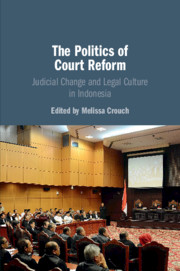Book contents
- The Politics of Court Reform
- The Politics of Court Reform
- Copyright page
- Contents
- Figures
- Tables
- Contributors
- Acknowledgements
- 1 The Judicial Reform Landscape in Indonesia
- Part I Continuity and Change in the General Court System
- Part II Specialised Courts Established under the New Order
- Part III Specialised Courts as Judicial Reform Strategy
- 7 Indonesia’s Anti-corruption Courts and the Persistence of Judicial Culture
- 8 The Commercial Courts
- 9 The Small Claims Court
- 10 The Fisheries Court
- 11 The Constitutional Court
- Part IV Courts and Rights
- Epilogue
- Glossary
- Bibliography
- Index
11 - The Constitutional Court
A Levian Take on Its Place in the Reformasi
from Part III - Specialised Courts as Judicial Reform Strategy
Published online by Cambridge University Press: 30 August 2019
- The Politics of Court Reform
- The Politics of Court Reform
- Copyright page
- Contents
- Figures
- Tables
- Contributors
- Acknowledgements
- 1 The Judicial Reform Landscape in Indonesia
- Part I Continuity and Change in the General Court System
- Part II Specialised Courts Established under the New Order
- Part III Specialised Courts as Judicial Reform Strategy
- 7 Indonesia’s Anti-corruption Courts and the Persistence of Judicial Culture
- 8 The Commercial Courts
- 9 The Small Claims Court
- 10 The Fisheries Court
- 11 The Constitutional Court
- Part IV Courts and Rights
- Epilogue
- Glossary
- Bibliography
- Index
Summary
This chapter draws on Daniel S. Lev’s work on Indonesian law and legal culture to assess the Constitutional Court’s role in the reformasi. One of the central themes running though Lev’s work, the chapter notes, was the idea that law’s claim to authority as an autonomous body of norms is invariably a function of politics – of the middle class’s need to promote this quintessentially liberal idea of law to further its own interests. On the other hand, Lev also recognised that societies generally prosper where there is public confidence in precisely this conception of law. This tension in Lev’s work may be resolved, the chapter argues, if law’s autonomy from politics is seen as being, not an empirically provable fact, but a constitutional-cultural ideology that may take hold under certain conditions. The third section uses this modified Levian conceptual framework to examine the Indonesian Constitutional Court’s role in promoting the rule of law after the constitutional reforms of 1999–2002. While the Court has made admirable strides, the chapter argues, its vacillation between a legalist and an instrumentalist conception of law has inhibited the consolidation of a stable societal understanding of its legitimate role in tempering the exercise of political power. The chapter conclusions on this score, despite differences of conceptualisation, demonstrate how vitally important Lev’s work still is to the fate of the Indonesian ‘law-state’.
- Type
- Chapter
- Information
- The Politics of Court ReformJudicial Change and Legal Culture in Indonesia, pp. 245 - 264Publisher: Cambridge University PressPrint publication year: 2019
- 1
- Cited by

